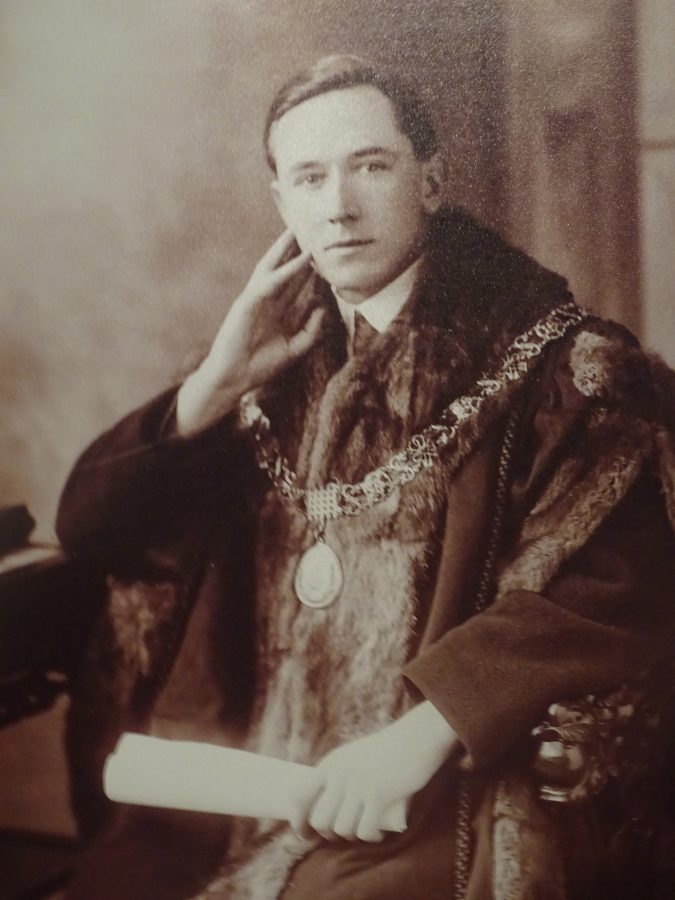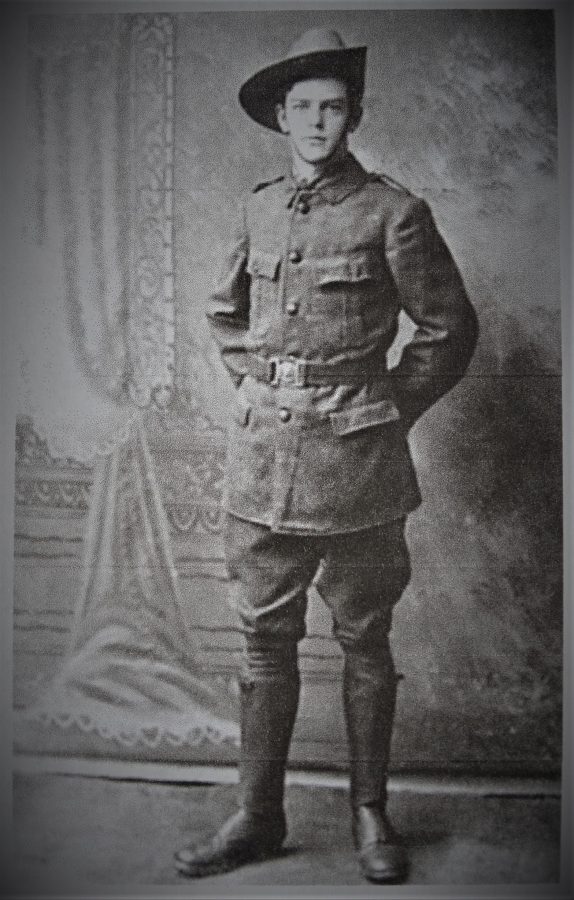
1074a. Lord Mayor of Cork Cllr Donal Óg O’Callaghan 1920 (picture: Cork City Museum)
Kieran’s Our City, Our Town Article,
Cork Independent, 12 November 2020
Remembering 1920: Arise Lord Mayor O’Callaghan
On 4 November 1920, a large public crowd attended at City Hall’s Council Chamber. They were present to witness the special meeting of the Council of Cork Corporation, which was being held with the purpose of electing a successor to Lord Mayor Terence MacSwiney. Councillor Donal Óg O’Callaghan, who acted in his capacity of Deputy Lord Mayor since the arrest of Terence, was unanimously elected to the vacancy.
On the night of Donal’s election, with 34 members of the 56 councilors present due to the ongoing war of Independence, Alderman Professor Stockley was moved to the chair. Fr Dominic occupied a seat alongside the Mayoral chair. On the motion of Cllr Micheál O’Cuill seconded by Alderman Edmond Coughlan, both of whom spoke in Irish, Donal was unanimously elected to the position of Lord Mayor. Some months previously on 10 March 1920 Sinn Féin‘s Donal Óg O’Callaghan emerged as a victor in the first bye-election after the January 1920 local elections for Cork Corporation. Donal was a fluent Irish speaker and was the youngest representative to have ever held the high and important office. He also occupied the Chairmanship of the Cork County Council.
Donal, who was received with applause, then signed his declaration of office and was invested with the Mayoral chain. First speaking in Irish and afterwards in English the new Lord Mayor spoke about his predecessors and the ongoing war with the British Government, and the Republican position of not backing down in their aspirations for Independence; “Our position was that one after another two Republicans who held thechair had been murdered by the British government. That same murder gang, who called themselves a Government, while the remains of Terence MacSwiney still lay over the ground, and while it was still possible for that gang to heap insult on the remains did so, and even then the same gang spread forth its tentacle to seize the next man. However, my position was, and we are are setting it forth this night as clearly and distinctly and glaringly as it could be possibly set forth, that we absolutely refuse to be tyrannised…our demand in the country has been made, and we are not going to flinch no matter what the result or cost might be”.
Following the Lord Mayor’s speech Alderman Tadgh Barry raised the execution of 18-year-old Kevin Barry from Dublin on 1 November 1920, who became the first Republican to be executed since 1916. Kevin Barry was an IRA section Commander who partook in various raids around Dublin city. On 20 September 1920, he participated in a raid where a street gun battle ensued, and three British soldiers were killed. Hiding under a tree Kevin was discovered and brought to Mountjoy Prison, where he refused to reveal the identity of his comrades. New legislation in 1920 had given military authorities greater powers to quell increasing IRA activity. Barry had privately admitted killing one soldier in an ambush and was tried as a soldier under the legislation. He was hanged for his crime. There was vast public outrage at the execution of a young man.
Alderman Tadgh Barry proposed a resolution: “That we the Corporation of Cork place on record our condemnation of the latest abominable crime, perpetrated by the British Government in Ireland in the murder, by hanging of young Kevin Barry, and offer our respectful sympathy to his patriot mother in her sorrow, and congratulations on her support of his refusal to purchase his life by betraying his comrades to his torturer?”. Tadgh’s motion was forwarded to the next meeting of the Council.
However, the deaths of young IRA volunteers continued. On 10 November 1920, 22-year-old Christy Lucey was killed at Túirín Dubh, Ballingeary, He took an active part in his local IRA company and on one evening he slept in the rough on a hillside. As descended the hillside the following morning, Christy was cornered by a group of Auxiliaries of C Company from Macroom and shot dead as he attempted to escape. The Auxiliary who shot him was himself soon executed by the IRA. When the Black and Tan individual returned to Macroom that evening, he entered the Market Bar and began to celebrate but was fatally shot.
Formerly a resident of Pembroke Street in Cork City, Christy was a former member of B Company of the First Battalion (Cork No. 1 Brigade) in Cork city. He was given an imposing funeral in the city and was buried in the Republican Plot in St Finbarr’s Cemetery. Such an event attracted much public interest including intimidating attention from British military forces in Cork city. As the funeral cortege commenced, an armoured car, in convoy with two lorries full of armed soldiers, arrived near the church. The officer in charge served a notice on Rev. J F Murphy, which denoted that only one hundred people would be allowed to take part in the cortege. As the cortege left the South Chapel and emerged into George’s Quay, an armoured car took up a position in the procession immediately before the carriages of the mourners. The coffin was draped in the republican colours and was carried on the shoulders of 4 Volunteers. On route to the cemetery, the paths along the route were filled with spectators.
A day after Christopher Lucey’s murder on 11 November 1920, Lord Mayor O’Callaghan and Father O’Leary, CC, of the South Chapel, received messages from Arthur Griffith, declaring that the Cork Hunger strike was to be ceased at Cork Gaol. To Griffith the prisoners had “sufficiently proved their devotion and fidelity, and that they should now, as they were prepared to die for Ireland, prepare again to live for her”. A small quantity of nourishment has been taken by the hunger strikers and it was hoped that they would recover.
A new book on Lord Mayor Donal Óg O’Callaghan’s life and times by UCC’s Dr Aodh Quinlivan and entitled Forgotten Lord Mayor, Donal Óg O’Callaghan, 1920-1924, will be published by Cork City Council this month.
Captions:
1074a. Lord Mayor of Cork Cllr Donal Óg O’Callaghan 1920 (picture: Cork City Museum).
1074b. Christopher Lucey as a Cork Fianna member in 1916 (picture: Cork City Library).

1074b. Christopher Lucey as a Cork Fianna member in 1916 (picture: Cork City Library).